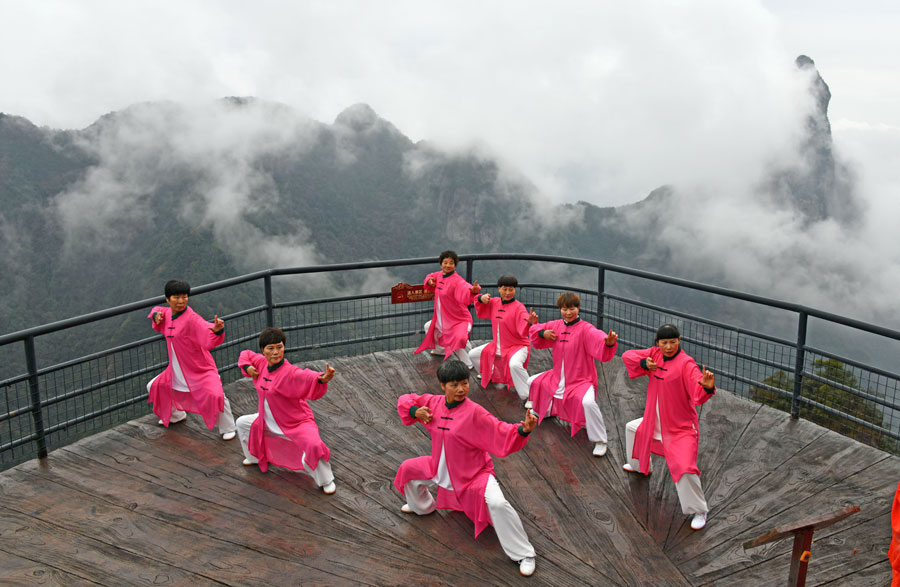Taijiquan inscribed on World Heritage List

(Photo source: Guangming Picture)
“Taijiquan” was inscribed on the United Nations Educational, Scientific and Cultural Organization (UNESCO) Representative List of Intangible Cultural Heritage of Humanity in the evening of December 17, attracting global attention.
Entries on the world’s Intangible Cultural Heritage List are the common cultural heritage of all humanity. The successful bid for Taijiquan means that it will receive more attention and support, and there will be more Taijiquan fans both at home and abroad. For the inheritors and learners of various schools of Taijiquan in Jiaozuo, Henan Province, the birthplace of it, this is an encouraging message. But for China, this means greater responsibility for protecting and inheriting Taijiquan.
With the core idea of Taiji and the dialectical concept of Yin and Yang in Chinese traditional Confucian and Taoist philosophies, Taijiquan is not only a traditional boxing technique, but also a mass physical practice of “cultivating one’s temperament and strengthening one’s health” and a cultural vehicle of such ideas as a righteous, neutral and flexible mind, and the unity of man and nature. For the majority of people, the most charming point of Taijiquan is that it barely has any restrictions on skills and places, and it can create a relaxing atmosphere.
Taijiquan has an extensive mass foundation in China, which is the most significant difference between Taijiquan and other “endangered” cultural heritages. The popularity of Taijiquan can be seen from either those practicing it in parks, or the characteristic Taijiquan courses in primary and secondary schools, either Taijiquan elements at some major sporting events, or the spontaneous Taijiquan craze in the streets.
According to incomplete statistics, Taijiquan has spread to more than 150 countries and regions, and more than 80 countries and regions have established Taijiquan organizations. With its entry onto the World Heritage List, there will be more Taijiquan fans around the world. It doesn’t indicate Taijiquan will be “highbrow” and “narrower”, but is an opportunity for it to win more people’s interest in a way that is more in line with the public aesthetic.
While cheering for Taijiquan’s success, we also need to remain in awe of the Taijiquan culture. The proportion of middle-aged and elderly people is larger among Taijiquan fans, which, however, doesn’t means that it’s an old-people-sport. On the contrary, Taijiquan is known for facilitating “both internal and external cultivation and moderate relaxation”. This Chinese charm of it makes it suitable to all age groups. Any conduct of using Taijiquan to please or confuse the public is essentially trampling on the intangible cultural heritage, to which we should stay alert and firmly opposed.
Up to now, China has 42 entries on the UNESCO’s intangible cultural heritage list, ranking first in the world. This is a good thing. And for good things, we Chinese people take a dialectical attitude featuring both joy and fear. Joy represents gratification and fear is awe. We need to retain a sense of awe and worry for Taijiquan, and resolutely prevent the cultural heritage from being ruined by anyone.
The success of applying for the world heritage status is not an “unparalleled honor”, but a new starting point for its inheritance and promotion in protection. We should strive for more people’s understanding, recognition of and love for Taijiquan through the aesthetic “Disenchantment” and with its approachable appearance. By doing that, the traditional Chinese culture and values carried by Taijiquan will widely spread around the world and benefit all mankind.
Author: Li Sihui, a distinguished researcher in News Review and Research Center, Huazhong University of Science and Technology
Translated by Pan Meng
[ Editor: Zhang Zhou ]




More From Guangming Online
Medics from Fujian leave for Shanghai to aid in battle against COVID-19 resurgence
New int'l land-sea transport service to Indo-China Peninsula launched
Another makeshift hospital under construction in Shanghai
Tourists view tulips in Suiping County, Henan
In pics: blooming gagea flowers on grassland in Zhaosu, Xinjiang
Greek workers stage 24-hour general strike over high prices